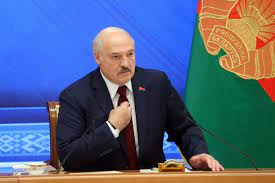Sanctions On Belarus:

The UK, the US and Canada have issued fresh trade, financial and aviation sanctions on Belarus, in a bid to increase pressure on the country’s leader Alexander Lukashenko.
- Europe’s longest-serving ruler, President of Belarus (Lukashenko) took office in 1994 amid the chaos caused by the collapse of the Soviet Union in 1991.
- Often described as Europe’s “last dictator”, he has tried to preserve elements of Soviet communism.
- He has been in power for 26 years, keeping much of the economy in state hands, and using censorship and police crackdowns against opponents.
- In 2020, after Lukashenko was announced as the winner in elections, protests broke out in the capital, Minsk which were met with a violent security crackdown.
- There has been widespread anger against the government over a stagnant economy and doubts about the fairness of the election.
Sanctions’ Targets:
- The idea is to focus on the regime and Lukashenko’s associates as precisely as possible and discourage Western companies from doing business with Belarus.
- The latest sanctions restrict exports of surveillance and military technology to Belarus.
- The sanctions partially ban imports of potash fertilizer, petrol and petrol-based products from Belarus.
- In the cases of the EU, U.K. and Canada, the embargo also restricts financial trade such as buying state debt and insuring or reinsuring state-related entities.
- The EU and US have sanctioned Belarus’ tobacco industry, which contributes to the lucrative cigarette smuggling trade.
- More than 90% of cigarettes smuggled into Lithuania came from Belarus in 2019.
- Western countries also blacklisted some Belarusian citizens.
Impacts:
- Targeting Belarus’ potash sector was a strategic move insofar as the country is the second largest exporter of the fertilizer behind Canada, covering 21% of the world’s potash exports in 2019.
- But, sanctions cover only 15% of all potash exports to the EU.
- Also, Russia represents 49.2% of all Belarusian trade and Belarus can export its sanctioned goods across the Russian border for re-export from there.
- The impact of restrictions on dual-use goods, monitoring and interception goods and technology, and goods used in cigarette manufacturing would be negligible.




